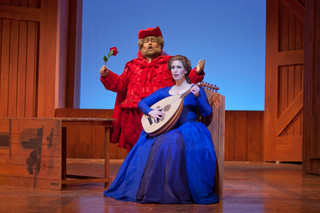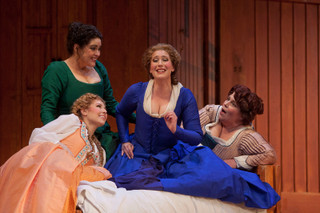|
Back
Falstaff overreaches San Diego
Civic Theater
02/18/2017 - & 21*, 24, 26 February 2017
Giuseppe Verdi: Falstaff
Roberto de Candia (Sir John Falstaff), Ellie Dehn (Alice Ford), Troy Cook (Ford), Maureen McKay (Nannetta), Jonathan Johnson (Fenton), Marianne Cornetti (Mistress Quickly), Kirstin Chávez (Meg Page), Simeon Esper (Bardolfo), Reinhard Hagen (Pistola), Joel Sorensen (Dr. Caius)
San Diego Opera Chorus, Bruce Stasyna (Chorus Master), San Diego Symphony Orchestra, Jeff Thayer (Concertmaster), Daniele Callegari (Conductor)
Olivier Tambosi (Stage Director), Frank Philip Schlössman (Set and Costume Designer), Christine A. Binder (Lighting Designer), Steven W. Bryant (Wig and Makeup Designer)

(© J. Katarzyna Woronowicz)
Though Verdi’s exiguous comedic writings began early on (and on a bad note at that) with the perfunctory Un giorno di regno (1840), Falstaff turned the tables in 1893. Verdi drew upon three of William Shakespeare’s literary works: Henry IV, Part I and Part II and The Merry Wives of Windsor. But inside the latter œuvre rests emphasized commedia dell’arte personae which are heavily typified in this Olivier Tambosi production. The final potent quotient excesses in oft broad humor.
Portraying the bull-legged Dr. Caius, Joel Sorensen shuffles onstage even before the baton is raised. When set against the music, the irascible man spouts off uncontrollably thereby triggering the Marx Brothers’ antics of Bardolfo (Simeon Esper) and Pistola (Reinhard Hagen.) Shakespeare’s simultaneously loved-hated roly-poly glutton (Roberto de Candia) takes all of this in. Despite his baritone voice, the timbre appears a tad light, a counter reflection to Shakespeare’s characterization. The nuances Roberto de Candia possesses, however, are witty enough with polite hints of sexual naughtiness. We have more empathy for the eponymous role when he is attacked by Windsor’s townspeople.

(© J. Katarzyna Woronowicz)
The quadrant of scheming women is headed up by Alice Ford, wonderfully interpreted by Ellie Dehn. Of all cast members, Ms. Dehn deflects Tambosi’s insurmountable hilarity by achieving comedic sarcasm judiciously. Her soprano voice is well-suited for the rôle, ensuring a bracket of sensibility, good taste and understated dominance. Since her appearance in La Bohème in 2010, one can see a greater depth of sophistication, poise, control, confidence and operatic maturity...she’s the glue that holds Falstaff together.
Symbolic colouring is subconsciously detailed in the ladies’ costuming as seen through the eyes of Frank Philip Schlössman: Nannetta’s couture is peach-orange to portray youthfulness and impulsiveness. Maureen McKay outlines Ford’s daughter with a fairly fluidic soprano line that expresses her jeunesse only to be reinforced by her pigtails. Where Ms. McKay shines best is in the softer, high notes. But her Nannetta is too juvenile and borderline child-like.
As for the amorous connect with beloved Fenton, Jonathan Johnson has the perfect set up: Mr. Schlössman opens Act III with movable panels gently peeling away to twinkling stars and silhouetted Herne’s Oak with Christine A. Binder’s luminescent moon. But the iridescence fades as he proceeds with the quasi-legitimate aria, “Dal labbro.” He appears to have been fading at this point as evidenced by broken legato and shortened holds.
Stock characters are also epitomized through Mistress Quickly. Marianne Cornetti is well cast as the Windsor interlocutor. Her deeply musky voice mollifies and gives comfort, yet the overgenerous hand rolling while singing “Reverenza” tires. Always a great punch of delight, Kirstin Chávez adds her own ingredient of perky fun as Meg Page.
Ahead of the climax to Act II, Troy Cook attempts to set up an Iago-like jealous equation within his “E sogno?” The monologue doesn’t particularly set up a Verdian ferociousness since his lower baritone register is lost inside the orchestra, only to be overcompensated in the middle to upper reaches. What should appear somewhat frightening comes across thinly palpable. While Olivier Tambosi’s overall blocking is exceedingly pliable and amusingly inventive, the tumultuous action leading up to the pushing of the laundry basket into the Thames doesn’t convince and looks blundering.
Daniele Callegari elicits some of the finest music ever heard in this Falstaff. Particularly telling is the lightness in woodwinds and strings. The tempo he commands is well tailored and acceptable for such an energetic piece.
Comedy is difficult to create, conduct and convince. Falstaff garners a few laughs, but tries too hard with its slapstick excesses.
Christie Grimstad
|